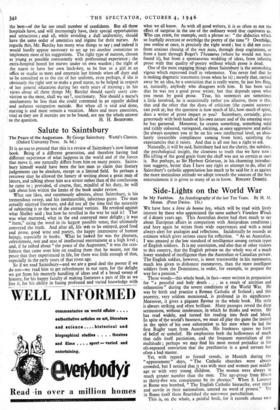Salute to Saintsbury
The Peace of the Augustans. By George Saintsbury. World's Classics. (Oxford University Press. 3s. 6d.)
IT is no use to pretend that this is a review of Saintsbury's now famous book. Being of a different generation, and therefore having had different experience of what happens in the world and of the forces that move it, one naturally differs from him on many points. Saints- bury himself would have been the last man to claim that literary judgements can be absolute, except in a limited field. So perhaps a reviewer may be allowed the luxury of writing about a great man of letters, and talking about him as a writer rather than of the conclusions he came to ; provided, of course, that, mindful of his duty, he will talk about him within the limits of the book under review.
What one likes, and enormously admires, about Saintsbury, is his tremendous sweep, and his inexhaustible, infectious gusto. The man actually enjoyed literature, and did not all the time feel the necessity of subjecting it to the test of the eternal verities. He revolted against what Shelley said ; but how he revelled in the way he said it! That was what mattered, what in the end conveyed most delight ; it was " form," using the word in its largest possible sense, that ultimately conveyed the truth. And after all, life wa's to be enjoyed, good food and prose, good wine and poetry, the happy intercourse of human beings, especially in books. What he looked for was the pleasure, refreshment, rest and ease of intellectual entertainent at a high level ; and, if he talked about " the peace of the Augustans," it was the rest- fulness that came over him on reading them that he meant, not the peace that they experienced in life, for there was little enough of that, especially in the early years of that riven age. So if we read Saintsbury—and we are a good deal the poorer if we do not—we read him to get refreshment in our turn, for the delight we get from his masterly handling of ideas and of a broad sweep of history, for his happy faculty of making literature a part of life as we live it, for his ability in fusing profound and varied knowledge with what we all know. As with all good writers, it is as often as not the effect of surprise in the use of the ordinary word that captivates us. Who can resist, for example, such a phrase as : " the didactics which so fearfully overcast or overbilge the poetry of the time "? Overbilge, you realise at once, is precisely the right word ; but it did not come from anxious chasing of the mot juste, through deep cogitations, or from a hunt through Roget's Thesaurus (where he would not have found it), but from a spontaneous wedding of ideas, from infusing prose with that quality of-poetry without which prose is dead. One of the most engaging things about Saintsbury is the astonishing vigour which expressed itself in vehemence. You never feel that he is making dogmatic statements (even when he is) ; merely that, carried away by an idea, by a conviction that is really warm, he just lets fling, at, naturally, anybody who disagrees with him. It has been said that he was not a good prose writer, but that depends upon what you mean by good prose. True, his sentences are sometimes a little involved, he is occasionally rather too allusive, there is this, that and the other that the daws of criticism (the cymini sectores) can peck at; but the question is how much of life, how much of spirit, does a writer of prose impart to you? Saintsbury, certainly, gives generously with both hands of his own nature and of the amazing store he has garnered. Moreover, he creates something, something solid and richly coloured, variegated, exciting, at once aggressive and polite (he always assumes you to be on his own intellectual level, an abso- lutely irresistible compliment coming from him), satisfying the expectancies that it raises. And that is all one has a right to ask.
Naturally, it will be said, Saintsbury had not the clarity, the subtlety, the psychological insight, the closeness to truth that we have now ; His sifting of the good grain from the chaff was not so certain as ours is. But perhaps, as Sir Herbert Grierson, in his charming introduc- tion suggests, better than I have any right to attempt to do, after all Saintsbury's catholic appreciation has much to be said for it as against the more meticulous attitude we adopt towards the sources of the best entertainment it is given to many of us to know. BONAMY nOBREE.






























 Previous page
Previous page